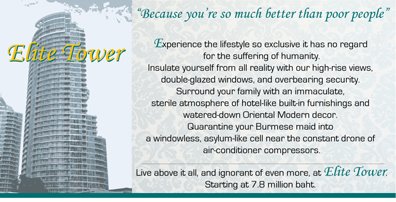Khon Kaen – Northern supporters of the Yingluck government who also enjoy drinking alcoholic beverages have found themselves in a moral conundrum, as investigation into the various ownerships of their favorite beers has revealed that they should all be boycotted.
In the wake of the general boycott in upcountry areas of beers produced by Boon Rawd Brewery which was in response to controversial statements made by corporate heiress Chitpas Bhirombakdi that upcountry voters didn’t understand democracy, many consumers are now experiencing the pain of politically responsible consumer choices.

“We started with a boycott of Singha and Leo, because of the insulting remarks by Chitpas,” said Patsaporn Chanbutra, an educator, referring to the events of a recent weekend evening with friends. “If only we had known the rabbit hole we were about to go down.”
According to Patsaporn, he and his friends enjoyed a “fleeting feeling of triumph” after going to their local shop and buying a case of Chang Classic, which they were about halfway through when one of them received a disturbing SMS from his brother in law.
“My wife’s brother Touman texted me and said we can’t drink Chang either,” said Meechapai Dipthithongwitsu, a truck driver. “I called him and he said that Charoen (Sirivadhanabhakdi) is a total snob who’s been pouring money into propping up the royal family all these years,” he went on, referring to the founder and chairman of Thai Bev, the parent company of Chang.
“I mean, we’re not against the royal family, but we know how these tycoons have been using the royals to provide protection to their corrupt system of elitism. So, no Chang either.”
The friends then were appalled to discover that every domestic beer, including Archa, Federbrau, Beer Thai, and Cheers was distributed by Boon Rawd or Thai Bev, leaving them no choice but to seek foreign beers. That path, however, revealed its own set of moral problems.
“We thought about Tiger, which is Singaporean, but then Somchai said that Singapore was a one-party state that didn’t have real elections. That didn’t sit right with us, so we decided against it.”
San Miguel pilsner was similarly renounced when a quick internet search showed that the San Miguel family had close ties to the Philippine army, which was “responsible for coups,” and Beer Lao was rejected on the grounds that its entry into Thailand was only made possible by the same free trade agreement that had led to Patsaporn’s friend losing his job when the factory he worked in closed and moved north to Vientiane.
Desperate for a drink but determined to live by their newfound principles, the friends briefly considered Heineken and Asahi, only to learn that both Denmark and Japan had been colonial powers, which Meechapai considered a deal breaker.
“Japan invaded Thailand in World War Two,” he said. “I can’t drink their beer.”
The group briefly settled on Hoegaarden, until they realized that it cost three times as much as their usual beers. Pricing concerns also ruled out all the choices they found on the website of specialist importers Beervana, which offered to ship them cases of American microbrew ales, the descriptions of many of which baffled the upcountry men.
“What the hell is a ‘chocolate stout’ anyway”? asked Somchai. “Is that even beer?”
After a six hour debate, Patsaporn lost his temper, grabbed Meechapai’s Samsung phone and turned it off, announcing that he was through trying to be a responsible consumer.
“We’re drinking Tsingtao and there will be no arguments!” he shouted at his friends. “It’s midnight and I’m fucking sober. Anyone who objects gets punched in the face!”
An hour later, all the men were enjoying their beers, and insisted they had “no regrets.”
“The Chinese don’t support anyone but themselves,” said Patsaporn. “They’re horrible but honest. That’s good enough for me. Cheers.”


